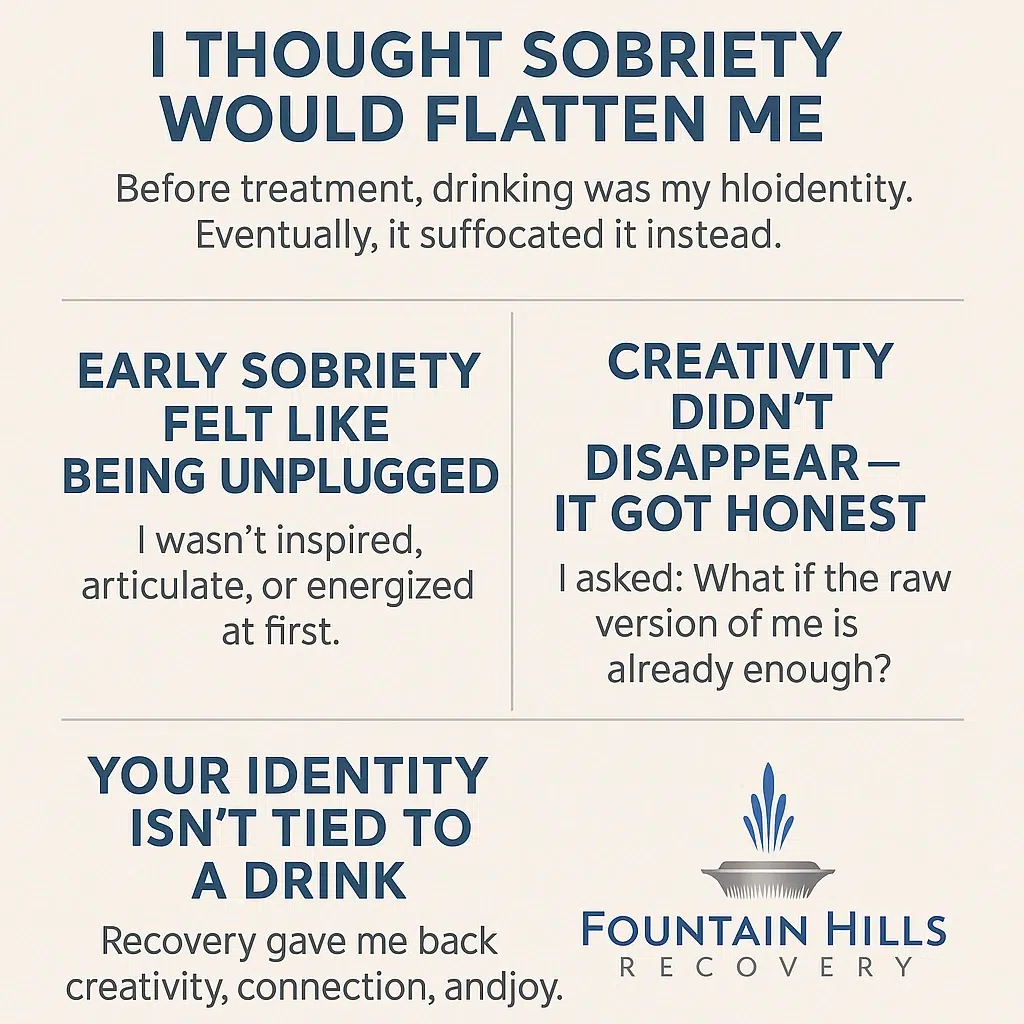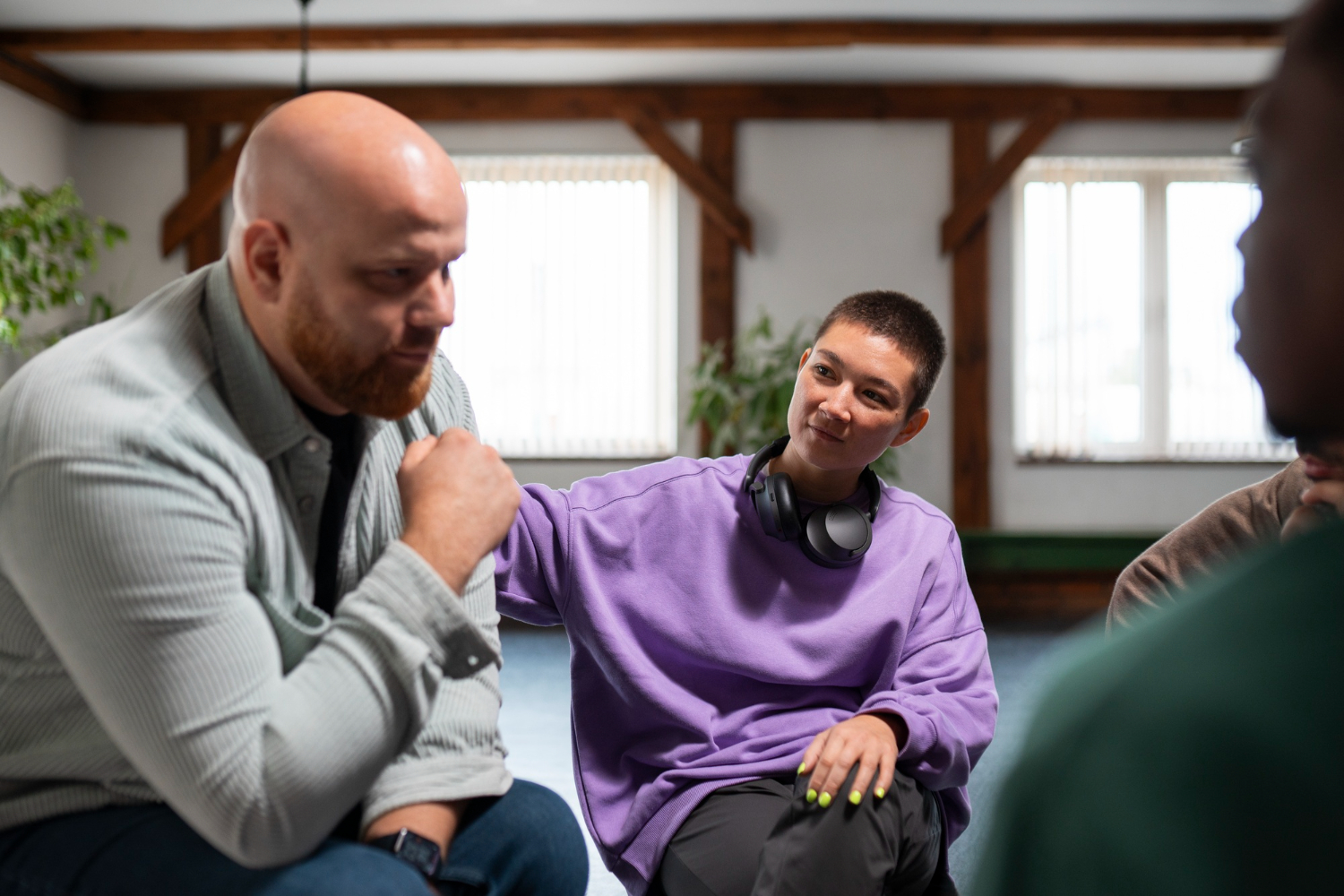There’s a myth I used to believe—that drinking was part of who I was. That alcohol gave me my spark, my voice, my stories. I truly thought sobriety would make me less interesting. Less creative. Less me. When I imagined quitting, it didn’t feel like getting healthy. It felt like disappearing.
But something unexpected happened during my time in an alcohol treatment program: I didn’t lose myself. I found the parts I thought were gone for good.
What I didn’t expect was that alcohol was actually blurring the very identity I was trying to hold onto.
I Thought Sobriety Would Flatten Me
Before treatment, drinking wasn’t just a habit—it was a whole identity. I was the “deep talk after two drinks” person. The “show up to the party with a bottle and a story” friend. The one who knew how to turn up the emotional volume just enough to feel something real.
I didn’t drink to escape. I drank to access something—connection, creativity, clarity.
Or at least, I used to.
Eventually, alcohol became less of a portal and more of a wall. The jokes stopped landing. My writing got stuck. Conversations blurred. I couldn’t remember what I said, or whether I meant it. And slowly, the thing I was using to keep my identity alive was suffocating it instead.
Early Sobriety Felt Like Being Unplugged
When I first arrived at Fountain Hills Recovery, I felt like someone had cut the power to the part of me that mattered most. I wasn’t inspired. I wasn’t articulate. I was shaky, tired, and raw.
There were no profound epiphanies those first few days. Just a quiet kind of panic: What if this really is who I am without alcohol?
But the staff didn’t try to talk me out of that fear. They met me there. And somehow, being allowed to say the quiet parts out loud—to admit that I was scared of becoming boring, muted, flat—helped something start to shift.
Creativity Didn’t Disappear—It Got Honest
There was a moment, maybe three weeks into treatment, where I was journaling during a therapy break. Not because I was told to. Just because something inside of me needed to write. And what came out wasn’t flashy or poetic. It was a simple, brutal sentence:
“I don’t know how to be seen without a filter.”
That cracked something open.
I had been using alcohol as a filter, both literally and emotionally. It softened edges. Turned the volume down on insecurity and turned it up on charisma. But sobriety forced me to ask: What if the raw version of me is already enough?
From that place, creativity didn’t just come back—it changed shape. It became clearer, sharper. Less about performance, more about truth.
I Had to Mourn the Persona I Built
Something no one tells you about getting sober: there’s grief. Not just for the substance, but for the self you constructed around it.
In treatment, I had to grieve the version of myself I believed was essential. The party version. The spontaneous storyteller. The confident flirt. I thought she was real.
But looking back, I can see now: she was built out of survival and habit. She served a purpose—but she wasn’t the full picture.
And the real me? The one underneath all the performance and self-medication?
She’s a little quieter. A little slower. But she feels everything. And that’s the version of me I’m learning to love.

Connection Came Back in Unexpected Places
There’s a cliché about recovery groups being awkward circles of people mumbling feelings. I used to believe that. Until I found myself laughing—really laughing—in group one day.
We were sharing the dumbest things we’d done drunk. I told a story I hadn’t thought about in years, and everyone cracked up. Not because I was drunk, but because they got it. The absurdity, the shame, the humanity.
That moment hit me hard. People still saw me. I was still funny. Still me. And maybe I didn’t need a drink to bring that out.
I Started Remembering My Own Story
One of the things that scared me most about sobriety was the idea that I wouldn’t be able to access my emotions anymore. That without the rush or the edge, I’d be stuck in some beige version of life.
But what’s wild is that I actually feel more now. The highs are real. The sadness hits deeper—but so does joy. And the memories I’m making now? I get to keep them.
I didn’t just get my story back in treatment. I got my memory, my voice, and my emotional range back.
Fountain Hills Recovery Made It Safe to Rebuild
The setting mattered. Fountain Hills Recovery isn’t cold or clinical. It’s real, and it’s human. The therapists didn’t treat me like a broken project. They treated me like someone worth getting to know—even when I didn’t believe that myself.
They helped me rebuild, not reinvent. That mattered.
And being in Fountain Hills, Arizona—where the sunsets felt bigger than my shame—helped me feel like maybe the story I was living still had room to grow.
Your Identity Isn’t Tied to a Drink
If you’re afraid to get sober because you think it’ll erase who you are—I get it. I was terrified of that too.
But I promise you this: alcohol didn’t make you creative, connected, or compelling. It may have numbed fear long enough for those parts to peek out. But they were already yours.
Recovery doesn’t steal those traits. It returns them to you—shaky at first, but stronger with time.
FAQs About Sobriety, Identity, and Alcohol Treatment Programs
Does getting sober mean I’ll lose my personality?
Not at all. In fact, many people find that their true personality becomes more visible in sobriety. Alcohol often masks insecurity or creates a version of ourselves we think people want to see. In recovery, you have the chance to show up as your full self—without needing to perform or filter.
I’m a creative person. Won’t sobriety dull my inspiration?
This is a common fear—and a valid one. But creativity isn’t fueled by alcohol. It’s fueled by access to your full emotional range. In sobriety, you may find that your ideas deepen, your focus sharpens, and your work becomes more authentic. It might take time, but inspiration returns—on your terms.
What if I don’t feel “ready” to stop drinking?
You don’t have to feel 100% ready to begin exploring change. An alcohol treatment program can help you understand your relationship with alcohol without pressure. Readiness isn’t a prerequisite—willingness to be curious is enough.
Will I still have fun without drinking?
Yes—but it may look different. In early sobriety, social events can feel awkward or flat. But over time, laughter becomes real, presence deepens, and fun isn’t tied to losing control. Many people find that their friendships and joy actually become richer in recovery.
Is it normal to grieve drinking even if it hurt me?
Absolutely. Alcohol may have been your coping tool, your social lubricant, or your creative crutch. Letting go of it—even for good reasons—can feel like losing a part of yourself. That grief is valid, and in treatment, it’s safe to name and process it.
You’re Not Losing Yourself—You’re Finding Your Way Back
Sobriety isn’t about becoming someone else. It’s about becoming someone you can recognize again. If you’re afraid that recovery will make you disappear, hear this from someone who’s been there:
You’re still here. Under the noise. Under the fear. Under the fog.
If you’re ready—or just curious—to explore what’s possible in a life without alcohol, Fountain Hills Recovery is here to walk with you.
Call (800) 715-2004 to learn more about our alcohol treatment program services in Fountain Hills, AZ. You don’t have to do this alone.





